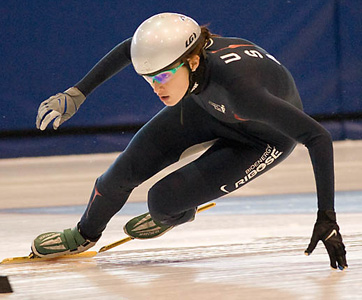 How do Olympic athletes train their minds for the challenges of such intense competition? Turns out, they work with a "mental coach."
How do Olympic athletes train their minds for the challenges of such intense competition? Turns out, they work with a "mental coach."In a 2/10 article on NPR.org, "Mind Games: Making Olympians Mentally Fit," Howard Berkes writes about short track speedskater Katherine Reutter's struggle to overcome insecurity and anxiety.
She turned to Nicole Detting Miller, University of Utah sports psychologist:
That strong sense of success applies to Reutter's upcoming Olympic experience.
At Green Room Speakers, I call this finding your Green Room Trigger.I can teach you how to identify a past success - a zone moment - and use it as a trigger each time before getting up to speak.
Over time, you will begin to asssociate speaking with that feeling of success and self-actualization.
From the Green Room: Speaking anxiety often stems from negative triggers, such as thinking about a past speaking or performance experience that didn't go so well. The Green Room Trigger helps you break that negative thought pattern and focuses you, instead, on your best self.





2 comments:
The skater's trigger -- recalling the accomplishment of a highly demanding training exercise -- was directly related to her upcoming Olympic performance. Do you think that the trigger might have been less effective if it had been something unrelated to skating such as success in a piano recital or on math test? In other words, I'm wondering to what extent the best trigger for reducing the stress of public speaking would be a previously well-executed presentation.
Great question. The article deliberately pointed out that this was an experience that took place "off the ice." I think the trigger does not have to have anything directly to do with speaking itself. I once had a client who chose the experience of being at the top of a high mountain. Thinking about the perspective she gained and the feeling of confidence greatly helped her in speaking situations.
Post a Comment